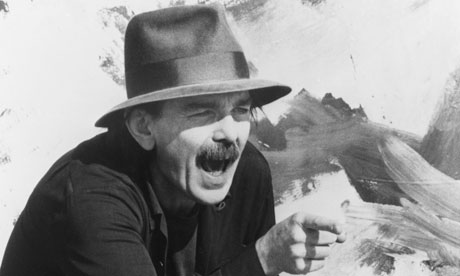The influence of Don Van Vliet, aka Captain Beefheart, stretched from the Grateful Dead to the Sex Pistols and beyond
- The Guardian,
- Article history

Don Van Vliet, better-known as Captain Beefheart, one of the most influential American musicians of the 1960s and 1970s and avant garde frontman of the Magic Band, has died in California, aged 69. A representative of the Michael Werner Gallery, in New York, which hosted several of his art exhibitions, confirmed his death from complications from multiple sclerosis in a statement yesterday.
With a mixture of Chicago blues, jazz, rock and his own experimental music his reach and influence stretched from the Grateful Dead and Jefferson Airplane in America to Jethro Tull, Hawkwind and Roxy Music in the UK. His biggest legacy may have been his influence on the punk movement, cited by several key figures as an influence, including Johnny Rotten.
Beefheart was a close friend of the late Frank Zappa, who played in the same group with him as teenagers and although they had a love-hate relationship they would play together later in life. Zappa often supported him – sometimes financially – at various key points in his life, and gave him a recording contract when other labels would not touch him.
As children they would listen to old rhythm and blues records, dreaming of projects that mostly came to nothing. One was to make a film called Captain Beefheart meets the Grunt People, which never happened but introduced the name by which he would later become known.
Born Don Glen Vliet, he later changed his name to Don Van Vliet, before changing it on the suggestion of Zappa to the stage name Captain Beefheart.
Singing and writing songs and playing harmonica and saxophone, he was backed by the Magic Band, a succession of musicians with as unlikely names as his own – Winged Eel Fingerling, Zoot Horn Rollo, the Mascara Snake and Rockette Morton – with whom he played between 1965 and 1982. They completed a dozen albums, of which the best-remembered is 1969's Trout Mask Replica, placed at number 58 on Rolling Stone's list of the 500 Greatest Albums of All Time.
Although his style was rhythm and blues based he introduced a completely unorthodox approach to structure, rhythm and key. The band wore a mixture of cloaks and second hand outfits, and the Captain wore a hat, usually a topper, which became his trademark.
He was a provocative and unpredictable figure, given to primal screams into the microphone or even grunts and was outspoken and candid about the music industry and the people in it.
He disbanded his group – or they abandoned him – in the 1980s, with some complaining he ran a regime that was little short of tyrannical. He concentrated instead on painting and became reclusive.
Tom Waits, another musician who was influenced by Beefheart, said of him: "Once you've heard Beefheart, it's hard to wash him out of your clothes. It stains, like coffee or blood."
He stubbornly refused to conform and that was perhaps one of the main reasons that commercial success eluded him as a musician, although he was fond of the lifestyle that success brought.
He loved fast cars and owned variously a Hudson, a Corvette and a Jaguar. However it was his art that brought him more commercial success: despite having no formal training he drew and painted throughout his recording career.
His first exhibition was in Liverpool at the Bluecoat Gallery in April 1972, while he was touring in England. In 1982, on the advice of New York art dealer Michael Werner that he would never be taken seriously as a painter unless he gave up music, Beefheart turned seriously to art.
In the past few years he gained a reasonable reputation as an artist, mainly doing large abstracts in oils, and was able to demand high prices for his work.
The Michael Werner Gallery, in a statement carried by Rolling Stone magazine, said: "Don Van Vliet was a complex and influential figure in the visual and performing arts." It described him as one of the most original recording artists. "
"After two decades in the spotlight as an avant-garde composer and performer, Van Vliet retired from performing to devote himself wholeheartedly to painting and drawing. Like his music, Van Vliet's lush paintings are the product of a truly rare and unique vision."
He leaves behind his wife of more than 40 years, Jan.
No comments:
Post a Comment